Archived Blog Posts
The Vital Importance of Regular Water Inspections
7/18/2023 (Permalink)
Water is an essential resource that we rely on for drinking, cooking, cleaning, and other daily activities. Ensuring the safety and quality of our water supply is of paramount importance to protect our health and well-being. Regular water inspections play a crucial role in identifying potential issues, preventing contamination, and maintaining a reliable water source. In this blog post, we will explore the significant reasons why regular water inspections are essential for every home and community.
Ensuring Drinking Water Safety
Regular water inspections help ensure the safety of our drinking water. Water sources can be susceptible to various contaminants, including bacteria, viruses, chemicals, and heavy metals. By conducting routine inspections, potential hazards can be detected early, and appropriate measures can be taken to address them. This helps to safeguard the health of individuals who rely on the water supply for consumption.
Identifying Plumbing Issues
Water inspections provide an opportunity to detect plumbing issues that may compromise the quality of the water. Leaky pipes, corroded fittings, or deteriorating infrastructure can introduce contaminants or lead to water loss. Regular inspections can help identify these problems and facilitate timely repairs, ensuring the integrity of the plumbing system and minimizing the risk of water contamination.
Preventing Waterborne Diseases
Waterborne diseases can spread rapidly if proper water quality measures are not in place. Pathogens such as bacteria, viruses, and parasites. Regular water inspections help monitor and control the presence of these disease-causing organisms, thereby reducing the risk of waterborne infections.
Compliance with Regulations and Standards
Water inspections are vital for ensuring compliance with local, state, and national regulations and standards. Regulatory bodies set guidelines for water quality, treatment, and testing to protect public health. Regular inspections help assess the water supply's adherence to these regulations, identify areas of improvement, and take corrective actions to meet the required standards.
Early Detection of Contamination Sources
Water sources can be vulnerable to contamination from various external factors. Industrial pollutants, agricultural runoff, improper waste disposal, and natural events like floods or landslides can introduce contaminants into water bodies. Regular inspections help monitor the water quality and identify potential sources of contamination. By detecting these issues early, prompt action can be taken to prevent further contamination and protect the environment.
Maintaining Water System Efficiency
Regular inspections contribute to the overall efficiency of the water system. Identifying leaks, optimizing water treatment processes, and monitoring system performance help conserve water, reduce wastage, and ensure efficient operation. This not only benefits the environment but also helps manage water resources effectively, especially in regions experiencing water scarcity.
Regular water inspections are essential for safeguarding public health, maintaining water quality, and complying with regulations. By conducting routine assessments, potential issues can be detected early, ensuring the safety and reliability of our water supply. From identifying contaminants and plumbing issues to preventing waterborne diseases and promoting system efficiency, water inspections play a critical role in ensuring the quality and sustainability of our water resources. Investing in regular water inspections is a proactive step towards maintaining a safe and reliable water supply for ourselves and future generations.
Understanding the Classification of Flood Water: Why it Considered "Black Water"?
6/18/2023 (Permalink)
When it comes to flood damage, understanding the nature of the water that enters your home is crucial. Floodwaters are often classified based on their level of contamination, with the term "black water" commonly used to describe the most hazardous type. In this blog, we'll delve into why flood water is referred to as "black water" and the potential risks it poses. Gaining this knowledge will help you make informed decisions when dealing with flood-related issues.
Sources of Contamination
Black water earns its name due to the significant level of contamination it carries. Unlike clean water from a burst pipe or rainwater, flood water typically originates from various sources. It can come from rivers, streams, or sewage systems, bringing along a mixture of pollutants, chemicals, debris, and potentially harmful microorganisms. The water can be heavily contaminated with sewage, industrial waste, pesticides, and other hazardous substances, making it highly unsanitary and dangerous.
Personal Risks
The classification of flood water as "black water" is not arbitrary—it underscores the risks it poses to humans and animals. Exposure to black water can lead to a range of issues. The presence of harmful microorganisms, such as bacteria, viruses, and parasites, in black water significantly increases the risk of infection. It is crucial to take immediate precautions and seek professional assistance when dealing with black water incidents.
Structural Damage
Apart from the personal risks, black water can cause severe damage to your property's structure and materials. The high level of contamination can deteriorate building materials, including drywall, insulation, carpeting, and furniture. Black water can penetrate porous surfaces and materials, leading to long-lasting damage, mold growth, and unpleasant odors. It is essential to address black water incidents promptly to minimize structural damage and prevent secondary issues such as mold infestation.
Professional Cleanup and Restoration
Given the hazardous nature of black water, it is crucial to entrust the cleanup and restoration process to professionals experienced in dealing with flood-related incidents. Certified disaster restoration companies have the necessary expertise, equipment, and safety protocols to handle black water effectively. They employ specialized techniques to remove contaminated materials, disinfect affected areas, and restore your property to a safe and habitable condition. Hiring professionals ensures that the cleanup process is thorough and minimizes the risk of further contamination or hazards.
Understanding why flood water is considered "black water" is essential for protecting yourself, your loved ones, and your property during flood-related incidents. Recognizing the contamination sources, risks, and structural damage associated with black water emphasizes the importance of seeking professional assistance for safe and effective cleanup and restoration.
Protecting Your Business: 8 Essential Steps to Prevent Fire Disasters
4/13/2023 (Permalink)
As a business owner, protecting your business from fire disaster should be one of your top priorities. Fire disasters can be devastating, causing physical harm to your employees, financial loss, and damage to your business's reputation. Therefore, taking steps to prevent fires and having a plan in place in case of a fire is essential. Here are some ways to protect your business from a fire disaster.
Conduct a fire risk assessment
The first step to protecting your business from fire is to conduct a fire risk assessment. This involves identifying potential fire hazards in your workplace, such as electrical equipment, flammable substances, and smoking areas. It also involves evaluating the risk of a fire starting and the potential consequences if one does.
Install smoke detectors and fire alarms
Smoke detectors and fire alarms are essential in detecting fires early, allowing you to take action before the fire spreads. Make sure you have smoke detectors and fire alarms installed in your workplace and that they are regularly tested and maintained
Train your employees
Training your employees on fire safety procedures is crucial in protecting your business from fire disasters. Ensure that all employees know how to use fire extinguishers and evacuate the building in case of a fire. Conduct regular fire drills to keep employees prepared for emergencies.
Have fire extinguishers readily available
Fire extinguishers can help to put out small fires before they become big ones. Make sure that you have the right type of fire extinguishers for your workplace and that they are readily available in case of a fire.
Keep your workplace clean and tidy
Clutter and debris can increase the risk of fire in your workplace. Therefore, it's essential to keep your workplace clean and tidy, particularly in areas where flammable substances are stored.
Check your electrical equipment
Faulty electrical equipment is a significant cause of fires in the workplace. Regularly check your electrical equipment for signs of wear and tear, and make sure that it is regularly maintained by a qualified professional.
Have a fire evacuation plan
Having a fire evacuation plan in place is crucial in protecting your business from fire disasters. Ensure that all employees know the plan and that it is regularly reviewed and updated.
Invest in fire-resistant materials
Investing in fire-resistant materials for your workplace can help to prevent fires from spreading and minimize damage if a fire does occur. Consider using fire-resistant building materials, furniture, and decorations.
In conclusion, protecting your business from fire disasters requires a proactive approach. Conducting a fire risk assessment, installing smoke detectors and fire alarms, training your employees, having fire extinguishers readily available, keeping your workplace clean and tidy, checking your electrical equipment, having a fire evacuation plan, and investing in fire-resistant materials can help to prevent fires and minimize damage if a fire does occur. By taking these steps, you can protect your business from fire disasters and ensure the safety of your employees and customers.
Will filing an insurance claim raise my rates?
3/8/2023 (Permalink)
If you're in an accident, file a claim with your insurance company. But will filing a claim raise your rates? The answer is complicated and depends on many factors. Your insurer might charge you more to make up for paying out money from the claim, or it might not change anything at all. To find out, first check with your insurer about whether filing a claim will affect your premiums at all. Then consider whether waiting until after the next time you renew your policy would be better than filing that claim now.
Insurance claims are common.
Claims are common. It's important to remember that this figure represents all claims across all types of insurance products, homeowners' policies as well as auto and life insurance policies.
In addition to providing valuable information about how much money was spent on claims during this time period (and therefore how much money could potentially flow into your pocket), these figures also show us just how common it is for people like yourself who have filed an insurance claim against their house after some sort of disaster or accident at home. If you're worried about whether filing one will affect future premiums based on what happened with another customer years ago who didn't pay off his debt until 2026...don't worry! Nowhere does it say, if someone else files a claim against their home then yours will cost more.
Insurance claim processing
Most insurance companies ask you to pay a deductible when you make a claim. A deductible is the amount of money that you must pay before your insurer will pay its share of the costs associated with repairing or replacing damaged property.
Claims take time to process. The insurance company has to verify the claim and make sure it's valid before they pay you. Once they do that, they'll pay out some money immediately (called "advanced payments") while waiting for contractors to complete the work and make sure everything was done correctly.
If your contractor isn't available right away or if there are complications with getting an estimate from them, this can delay things even further.
Claims can change your premiums.
Claims can change your premiums, but might not raise them for a long time. Insurance companies look at claims history when setting premiums, so if you make a claim, you may be charged higher rates for a few years. However, if you have a good track record with the company and have been with them for several years (which is why they gave you insurance in the first place), then they may give discounts on future policies or even offer new ones at lower rates.
Check with your insurance company.
Before filing a claim, it is important to check with your insurance company to determine how they handle claims. Some may have a policy of increasing rates after a claim has been made. Others will not raise premiums until the following year, but then keep those increased rates for 3 years or more. If you have had multiple claims within the past three years, this could be an indication that your driving record is not ideal and could result in higher premiums when purchasing new coverage.
The best way to know if filing a claim will raise your insurance rates is to contact your insurance company. Most of them will be able to tell you how claims affect premiums, and they may even offer special discounts for customers who have not filed any claims in the past few years.
How to prevent a Grease Fire
2/14/2023 (Permalink)
Grease fires are one of the most dangerous types of fires that you can encounter. They may not seem like much at first, but they can quickly spread throughout your entire home or business. Taking some simple steps to prevent a grease fire is important for everyone who uses the kitchen.
Fire Prevention
Make sure your cooking space is clear of all oil spills or food and supplies that could potentially cause a fire to ignite. All oils have different properties and respond differently to heat. Olive oil has a high smoke point and so it can withstand high temperatures without burning. Peanut oil is great for frying because it has more saturated fat than other types of vegetable oil. Canola oil also has a relatively high smoke point but has been genetically modified to not contain toxins.
How to Extinguish a Grease Fire
If a grease fire does break out in your kitchen, cover the top of the container with a lid. This is an easy way to control a grease fire, as it prevents oxygen from entering the container and feeding the flames. If you don't have an immediate lid, try using baking soda or another powder-based kitchen fire extinguisher to smother it instead.
Use salt or sand if you have enough of it. If there's any salt or sand nearby (such as in your garage), use this method in place of covering up with a lid because these materials can be more effective at quenching flames than lids are. Just sprinkle some over one side of the flame until it dies out completely!
Contact your local emergency services if the flames look like they may grow larger than expected or reach somewhere dangerous. You should never attempt anything more than controlling them yourself when dealing with such small sources of heat.
Shut off the Gas
If a grease fire is out of control, you may need to shut off the gas and electricity. Shut off the gas by shutting down your home's main valve at the source (usually located near where the piping enters your home). You can also check for an emergency shutoff lever on or near your stove top for quick access in case you need it. Shutting off both of these sources will cut off any more fuel from getting into the kitchen, which should help put out any flames that remain.
Open windows as soon as possible after turning off electricity and gas to let out heat and prevent further damage to surrounding objects if they're still burning. Call 911 once you've successfully closed all sources of fuel feeding into your kitchen, but don't wait until you've done this—the longer it takes for someone else to get there, the worse things could get!
Grease fire safety is an important topic because if you are not prepared, you can cause serious damage to your home and put your family at risk. If your home or business suffers from a fire loss, give SERVPRO a call immediately.
Steps to Prevent Commercial Kitchen Fires
1/9/2023 (Permalink)
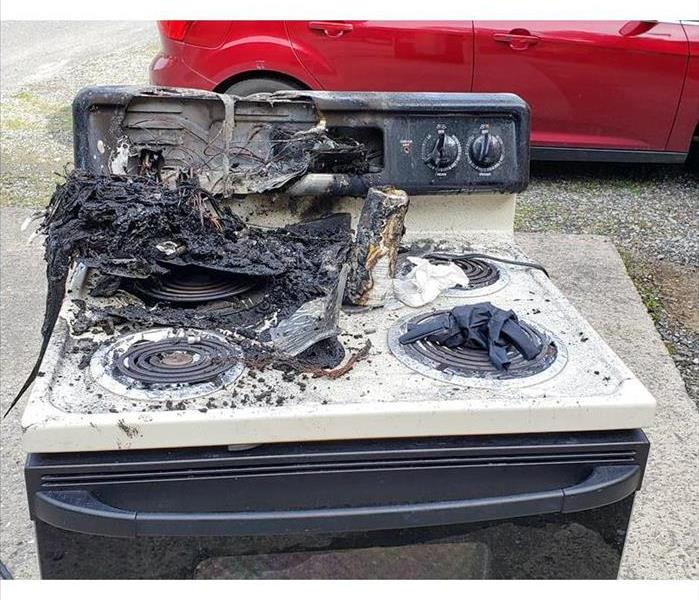 A kitchen fire can be a dangerous and costly event.
A kitchen fire can be a dangerous and costly event.
Cooking is one of the most common causes of fires in commercial kitchens. With proper training and planning, you can reduce the risk of a fire by keeping your kitchen clean and maintaining your equipment.
Make Sure All Cooking Equipment is in Good Condition
To prevent commercial kitchen fires, you should make sure that all cooking equipment is in good condition. This includes checking the age of the equipment and making sure it hasn’t been damaged by heat or water damage. You should also check that it operates properly and has been maintained properly. It should have proper safety features such as automatic shut-off switches or flame detectors, as well as fire protection features such as sprinkler systems or firewalls between areas where combustibles are stored and cooking areas.
Have Your Equipment Serviced Periodically
You will also want to perform regular maintenance on your equipment. Many cooks choose to have their gas ranges serviced annually, as this can prevent common issues like carbon buildup and clogged pilot lights. If you are using a wood-burning oven, it is recommended that you have it inspected every two years by a professional.
Other than having your equipment serviced, there are several steps that you can take in the event of an actual fire in the kitchen:
- Call 911 right away if the issue is too big for yourself or someone else to handle on their own.
- If possible, put out small fires with baking soda or salt — remember that water may cause electrical fires!
Keep the Kitchen Clean
Cleanliness is an important part of keeping your kitchen safe. Wiping down surfaces, especially those that are near grills or ovens, can help prevent fire from starting in the first place. It's also important to keep your grease traps clean and free of debris like food scraps and paper towels; if they get clogged with debris and start building up grease, you might end up with an even bigger mess on your hands. Make sure to regularly clean out any grease buildup in drains as well; this will help prevent fires from starting because there won't be enough room for excess oil when it drains down into the sink. Finally, make sure all exhaust fans are functioning properly so that smoke escapes but doesn't build up in your kitchen space.
Train Staff
Train staff on how to deal with fire emergencies. Your employees must know what to do in the event of an emergency, such as a fire alarm or kitchen fire. This includes evacuating people from the building and calling 9-1-1 for help.
Train staff on how to respond to fire alarms. Make sure everyone knows where their designated exits are in case of an emergency, including which doors should be opened first if there is smoke or other obstructions in the way.
Train staff on how to evacuate the building during an actual fire. If there truly is a kitchen fire, all employees should know exactly where they are supposed to go in order not only to provide them with enough information but also to make sure they're safe as well!
Create an Emergency Plan
An emergency plan is a formal document that details the procedures for handling an emergency. This includes identifying the different types of emergencies that could occur in your commercial kitchen and knowing what to do in each type of situation. The plan should also include a section on evacuating the building and contacting the fire department, police, or ambulance if needed.
A kitchen fire can be a dangerous and costly event. But if you follow these steps, you can prevent it from happening in your commercial kitchen.
10 Ways To Prevent Home Flooding & Water Damage
12/16/2022 (Permalink)
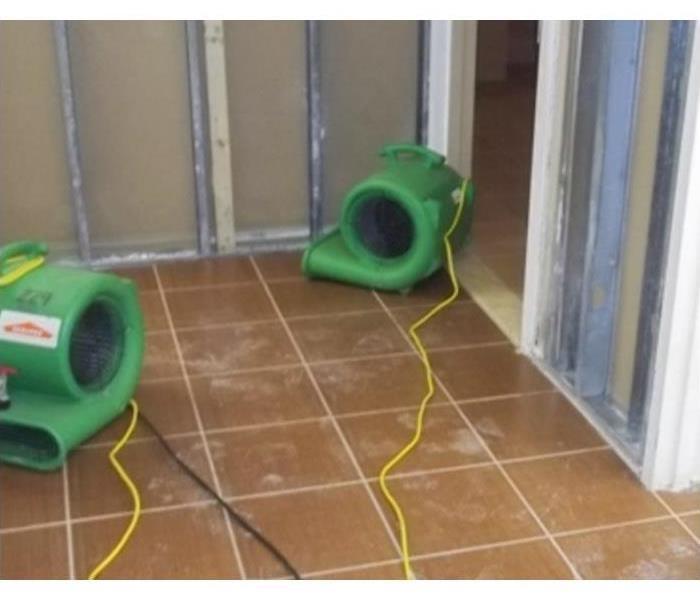 When it comes to your property, you must take steps to protect it.
When it comes to your property, you must take steps to protect it.
Prevent Home Flooding & Water Damage
If you're reading this, you're likely aware of the risks of flooding, especially if you live in an area that's prone to it. But even if your home isn't in a flood zone, a sudden storm or burst pipe can cause major damage and lead to a costly clean-up bill. To protect against water damage, it's important to take preventative measures like checking your gutters and windows regularly — and knowing when to call in the experts. Here are 10 steps that every homeowner should take to keep their property safe from flooding:
Check Your Gutters
Gutters are an overlooked part of many home maintenance routines. That's unfortunate, because when your gutters are clogged, damaged or leaking, you're at risk for water damage and other costly problems. A quick glance around the exterior of your home can tell you if there is any damage to the gutters that needs repair before winter hits.
Gutter guards can help keep leaves out of your gutter system and prevent clogs from forming. The best way to deal with them is by calling a professional who has experience working with this type of installation so they know where to place guards that will give you full protection during rainy season.
Check Your Windows
Check for cracks in the window frame. If you find any, replace them immediately to prevent water damage and mold growth inside your home.
Look for condensation on the inside of the window. This might indicate that it's time for a change of season or that there's a leak somewhere nearby — and if it's not just condensation, it could indicate a problem with the sealant around your windowsills or frames that needs to be fixed before too long. Inspect each window gasket for leaks around its edges and make sure they're in good condition (if they are old). This will help keep water from entering your home through cracks as well as keep out moisture from inside when it gets cold outside. Finally, check for stains on exterior walls near windows; these can indicate leaks onto exterior surfaces which may have occurred years ago but are still visible today!
Install a Sump Pump
You'll want to install a sump pump at the lowest point of your home. This can be in the basement or even an unfinished attic. It should be installed in a dry and accessible location so you can easily access it if it needs repair or maintenance. A sump pump will remove water from your basement, but you may also want to consider installing floodgates or other types of protection against flooding, depending on how much damage flooding has caused in the past and how often it occurs.
Seal Your Foundation
If you don't have a basement, you can still get water damage when it rains. Water enters through any gaps or openings in the foundation and can seep into the walls, causing mold and rot to form. To prevent this from happening, install a waterproofing sealant around window frames, doorways, and other openings that are not fully covered by siding or brickwork. A professional will be able to help you determine whether your home has been adequately sealed against water intrusion — and if not how best to remedy the situation.
Upgrade Old Appliances
- Replace old appliances.
- Check the energy efficiency of your appliances.
- Replace your water heater with a more efficient model.
- Check the efficiency of your refrigerator, dishwasher, and washing machine.
Insulate Water Pipes
Water pipes are a common source of water damage in the home, particularly during the winter when they are prone to freeze. To prevent this, you can insulate them. Insulating hot water pipes will reduce your energy consumption and help make your home more comfortable in the winter months. Hot water pipe insulation is very easy to install and can be done in just a few hours. If you have an attic, it's best to add insulation there because this is where most of your water pipes are located.
Protect Against Sewer Backups
Install a backwater valve. If you live in a high-risk area, you must have a backwater valve installed on your property. It will prevent sewage from backing up into your home if there is heavy rain or flooding in the area, which can lead to water damage and mold growth.
Assess Your Risk for Flooding
Before you do anything else, it's important to assess your risk for flooding. If you live in an area that is at risk for flooding, then it's essential that you familiarize yourself with what may happen and how to prevent it. The best way to protect yourself from flood damage is by knowing the signs of possible water damage and taking preventative measures before any actual damage occurs.
Check Your Local Weather Forecast
The first thing that you should do is check your local weather forecast. If heavy rains are on their way and predicted to occur within 24 hours or less, then this could be an indication that a storm drain system might overflow into your home due to high water levels in the streets. This can be especially problematic if there isn't proper drainage around your home (like gutters).
Elevate Appliances & Furniture
If there's a chance your couch could get wet in an apartment flood, place it on top of some plywood so that its legs don't get submerged. A heavy-duty plastic cushion can protect the fabric from moisture while keeping it elevated above any potential floodwaters on the floor below. If your rugs or area rugs are susceptible to water damage, move them off-site until they're needed again.
Buy Flood Insurance
Flood insurance is a type of insurance that covers damage to your property due to flooding. It also covers contents that were damaged in the flood and any additional living expenses incurred while repairs are made or if you need to temporarily move out of your home. If a flood occurs and you don't have flood insurance, you will be responsible for paying all costs associated with the cleanup and repairs yourself.
The good news is that many homeowners’ policies do include some coverage for flooding, but it's usually not enough to cover all the damages that can occur from this type of event. To get adequate coverage, you'll need to purchase separate flood insurance through an independent provider such as NFIP (National Flood Insurance Program).
We hope that this blog has helped you better understand what you can do to prevent water damage in the home. When it comes to your property, you must take steps to protect it. And while prevention is always better than cure, if something does happen, don’t panic! We have a team of experts at SERVPRO of Nantahala who can be there within hours with all the equipment needed for any type of emergency — and we promise we won’t leave until everything is back in order again.
How Do You Prevent a Water Damage?
11/1/2022 (Permalink)
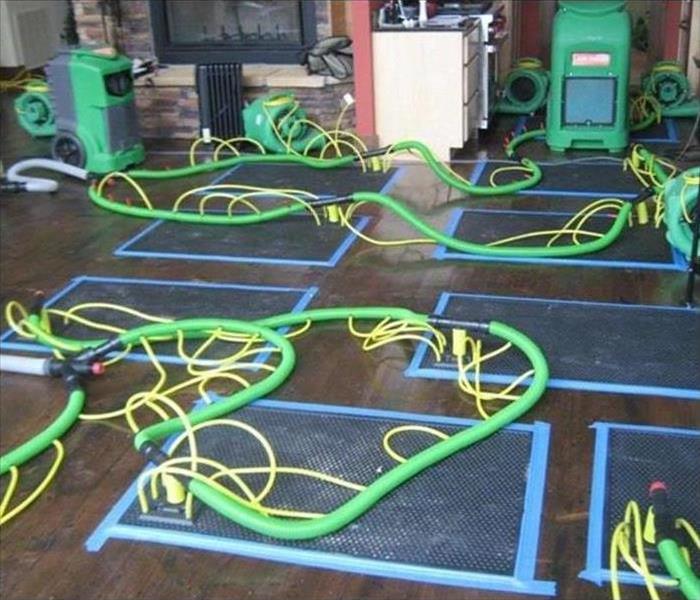 Water damage in Franklin, NC
Water damage in Franklin, NC
How Do You Avoid Water Damage?
Water damage is one of the most common disasters in homes. It can happen to anyone at any time. However, there are many ways that you can prevent water damage in your Franklin, NC home.
First, do your water damage prevention upfront before you even buy your home.
The first thing you should do is to check your property for leaks. If there are any, they must be fixed before you move in.
After that, check the property for mold and water damage. Make sure that there are no signs of flood damage as well. This can often be a problem with properties located near a creek or river in areas prone to flooding during heavy rainfalls and spring thaws.
If you notice any of these signs, contact an inspector immediately before buying the home so that they can determine whether there is anything structurally wrong with it (and thus something worth fixing prior to purchase). You’ll also want to make sure that any necessary repairs have been done already (you don't want to buy a house only after finding out there's mold growing everywhere) and that proper measures have been taken against future damage by ensuring insulation around pipes or other essential household.
Second, call SERVPRO of Nantahala and have them come out and inspect your home.
The second thing that you can do is to call SERVPRO of Nantahala, or another water damage restoration company and have them come out and inspect your home. They're going to be able to see all the damage that has occurred and then they'll give you a free estimate on how much it will cost to dry out your home. Once they have inspected your property, they can help you get started on getting things repaired quickly so that you can move back in as soon as possible.
Third, have some sort of insurance in place.
Number Three is to have some sort of insurance in place, whether it's through your homeowners policy or a different policy that can protect you from water damages as well as fires.
Talk with your insurance company about what kind of coverage you have and how much coverage you need. The more assets that require protection against water damage and fire, the more coverage will be needed. If there's any doubt about whether your home has adequate fire or flood insurance, contact an agent today!
Fourth, check the pipes in between the furnace and the hot water heater.
- Now if you've got an older home, those pipes can get cold. And if they're not insulated properly or they are touching each other, then you can get a freeze there and then when that happens it'll burst your pipe. So, you want to make sure that there's plenty of space between them so it doesn't happen again.
- Also make sure there isn't any water around those pipes because if there is, then it's going to freeze during those cold winter months and burst your pipe too. So, we recommend having an electric heater running down here too just so that keeps everything nice and warm so nothing freezes up on us when we're not looking for these things!
Fifth, make sure that your hot water heater is protected and up to code.
One of the most common causes of hot water heaters bursting is when they're not properly protected. So, generally, you should make sure that:
- The shut off valve on your hot water heater is in good working order and that it's located near where the tank is installed. This will allow you to easily turn off the flow of water if there's a leak or other problem with your unit.
- Your drain for draining out excess water from your tank has a trap and isn't connected to any sewer pipes—this can cause serious problems if not done correctly!
How Do You Prevent a Water Damage?
You know how to prevent a water damage, so now you can put your new knowledge to good use. The next time you see those pesky puddles forming in the bathroom or kitchen, don't panic! Instead of reaching for the phone and calling SERVPRO of Nantahala NC, follow these 3 tips:
- Check the pipes between the furnace and hot water heater.
- Make sure your hot water heater is protected and up to code.
- Have insurance in place.
Hopefully, you have a better understanding of how to prevent water damage. As you can see, there are many things you can do to protect your home and prevent water damage from occurring.
Should You Choose the Mitigation Company to do the Rebuild?
10/7/2022 (Permalink)
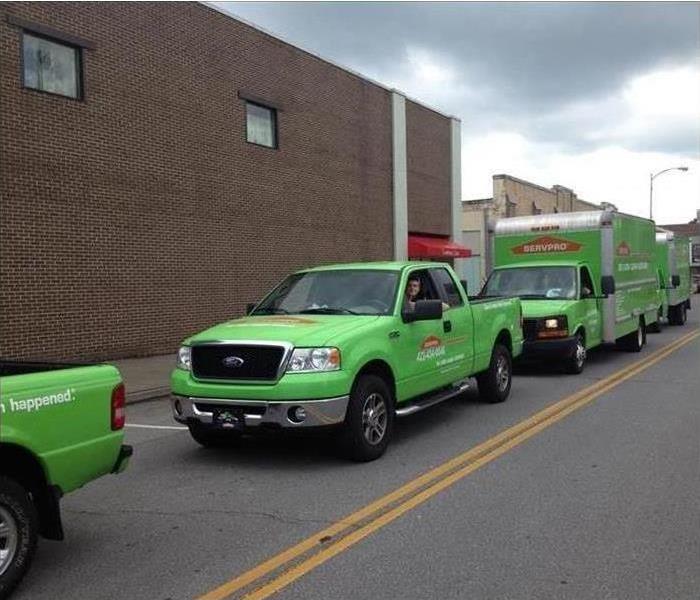 SERVPR of Nantahala can handle any job.
SERVPR of Nantahala can handle any job.
What's Involved In the Mitigation and Reconstruction Process
Restoration after a flood or other natural disaster can be a daunting process, especially if you don't know where to start. This guide will help you understand what's involved in the mitigation and reconstruction process.
There are many unknowns that can impact how long the reconstruction process takes to complete.
The reconstruction process is unpredictable. It depends on many factors, including the extent of damages and your insurance company's decision-making process. You should also consider that there are other unknowns that may impact how long it takes to complete the reconstruction project:
- The company you hire to do your rebuild may make mistakes during the rebuilding process, which can delay completion.
- If there is structural damage from high winds or flooding, then additional steps must be taken before reconstruction begins (such as removing debris).
The first thing you'll need to consider is the insurance claims process.
The first thing you'll need to consider is the information you receive from your insurance claims adjuster.
Generally speaking, insurance companies are big, impersonal corporations. They're used to dealing with claims on a large scale and don't want any trouble from their customers. If they think that you might cause them problems (for example, if they think your claim will be more complicated than others), they'll likely give your case the cold shoulder or send a low-level employee who doesn't have the authority to make decisions about it. If this sounds familiar, SERVPRO of Nantahala can help!
Another thing you'll want to decide on is whether you'll use a mitigation company that does both the cleanup and reconstruction services.
When choosing a mitigation company, you should make sure that it does both the cleanup and reconstruction services. If your home was damaged beyond repair during a flood or other natural disaster, then you'll want to ensure that your contractor can rebuild it in such a way that it's resistant to future weather conditions and damage. This means they should offer materials with high performance ratings (such as those from Shake-R-Dry) and have experience building homes in your area's climate.
Another thing you'll want to decide on is whether you'll use a mitigation company that does both the cleanup and reconstruction services. If so, consider these things:
- The company’s reputation—you need someone who has successfully completed projects like yours before.
- Their track record—does their work stay on time? Does their work stay within budget?
Choosing a one-stop-shop for the entire restoration process will go a long way toward speeding up your final walk through with the insurance adjuster.
The idea of doing everything yourself is appealing, but it can be a daunting task. It can ultimately cost more in time and money for you to try to do everything yourself than if you had hired a professional from the beginning.
A second benefit of choosing one-stop-shop companies is speedier assistance when dealing with your insurance company adjuster. Because they have already done much of the work required on their end, they are better prepared when it comes time for them to negotiate with your adjuster or assist during inspections or final walkthroughs. This allows them to move things along faster and get everyone paid faster!
With so much to think about and plan for, it can be hard to know which decisions are the right ones for your disaster recovery. If you're still unsure about any of these issues, consider getting in touch with a professional restoration company like SERVPRO of Nantahala first. We have decades' worth of experience helping others who've been through similar situations. Let us help guide you through this process with as little stress as possible!
How To Become a Preferred Vendor
8/12/2022 (Permalink)
Getting Started as a Preferred Vendor
Not all restoration companies are created equal. Your company needs help to restore your business space after a disaster in Murphy, NC, and you want to make sure that your first pick will be easy to work with, reliable, and provide superior service. Your insurance agent will provide you with a list of preferred vendors, but how can you know that you're really getting the best? At SERVPRO, you'll find some of the most stringent standards in the industry that ensure your project will be completed with excellence every time.
1. Quality Checks
When your insurance agent recommends a local franchise to complete your project, the SERVPRO vendor program has 21 guidelines that franchise owners must adhere to in order to earn jobs when you, the client, call the restoration hotline. These guidelines include conducting background checks for all employees, submitting to internal auditing for quality assurance, and maintaining all proper insurance coverage.
2. Rigorous Documentation
From the moment the customer contacts the restoration hotline, your case will be tracked every step of the way. You will be presented with information about which local franchise you were connected to, the amount of time it took to respond, the cause of the claim, and each step that was taken to complete your project.
3. Project Validation
Restoration companies have standards that must be followed when completing a project. You'll never have to wonder if your site was cleaned properly because you can request that drying validation be a part of your project documentation. You as the business owner can see the standards that the company promises and the tools that are to be used; there are no industry secrets. This transparency can provide you peace of mind, knowing that your restoration project was done to the highest standard.
When your insurance agent provides a preferred vendor list that includes a local SERVPRO franchise, you can be confident that your restoration project will be backed by high industry standards.
How To Use a Fire Extinguisher
7/28/2022 (Permalink)
A Guide to Fire Extinguisher Use
A home fire can have many causes and can happen at any time. It's important for homeowners in Franklin, NC, to keep a fire extinguisher handy inside the home so a fire can be extinguished before it gets out of control. While the majority of homeowners have an extinguisher inside the home, research shows less than half actually know how to use one.
Being Prepared
A homeowner should not only be prepared to use a fire extinguisher at a moment's notice, but they need to know where to find it. If an emergency does arise, you'll be quicker to act on it. Situations in which you might need a fire extinguisher include:
- When the fire is contained to one object
- You feel confident in using the extinguisher
- You have the right extinguisher type
While you should always call the fire department before using an extinguisher, you should get out of the structure if you're aren't confident in how to use the device. It's always best to put safety first, and during a fire is not the time to try to learn how to use an extinguisher. Fire damage can always be reversed during restoration.
Extinguishers are made for different types of fire. Some extinguishers are water-based, and made for common products such as wood, cloth, plastic, or paper. The majority of homeowners will only have a class A extinguisher. You wouldn't want to use a class A extinguisher on a gas burner during a kitchen fire.
Using the Extinguisher
You'll be confident in using your extinguisher if you remember the acronym P.A.S.S. This stands for pull, aim, squeeze and sweep. First, you pull the pin, then you aim the extinguisher, squeeze the handle and sweep from side to side.
If a fire happens, always think first. A fire extinguisher can be a powerful tool against devastating damage, but only when you know how to use it properly. It's a good idea to periodically refresh yourself on fire safety and proper usage of the extinguisher in your home.
3 Steps to Take After a Toilet Floods Your Office Building
7/19/2022 (Permalink)
Three Things to Do If a Toilet Overflows in Your Office Building
Office toilets are utilized with much greater frequency than a standard residential toilet. If you're an office manager in Nantahala, NC, it is important to have your bathroom facilities checked and maintained regularly because a flooded toilet could cause major problems for your whole building, not just your floor. If you have discovered that damage has occurred on multiple floors, there are some steps that you should take to clean up quickly and completely.
1. Call Your Insurance Company
Insurance policies differ in their coverage of sewer damage, so it's important to know what your policy states. A backup and an overflow are not the same thing, and therefore, may be expressed uniquely in your policy, or one may be covered while the other isn't.
2. Assess the Extent of the Damage
Communicate with any offices on the floors below yours. Have they experienced any problems, including leaks or bad smells? Water can soak into the floors and walls and can damage electrical wiring. Sewer damage can also cause health hazards, so if you see any obvious signs of problems or you're worried that there might be, close off the area until a professional can come to assess the damage and better inform you of any dangers.
3. Hire a Water Damage Repair Company
The more time spent on cleanup and repairs, the longer the loss in productivity will be, and the more difficult it is to take on new clients. Hire a water and sewage company that will not only assess the damage but will disinfect the areas before repairing them so that you and your coworkers can have a healthy work environment.
Sewer damage can be costly and time-consuming. Ensuring that you have an up-to-date insurance policy that covers various types of toilet-related water damage and maintaining your office's facilities can save you a headache in the event of a flooded toilet at your office.
Water Damage: 4 Steps for Drying Out Your Commercial Property
7/12/2022 (Permalink)
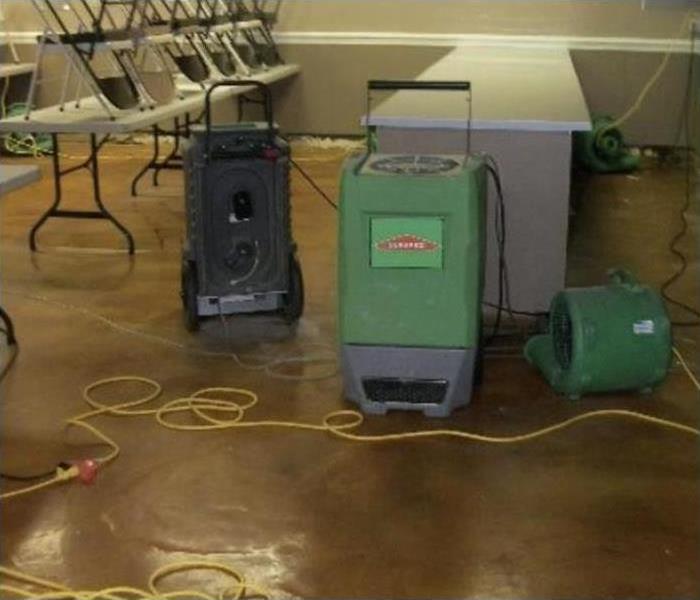 Water cleanup in a Sapphire, NC commercial facility.
Water cleanup in a Sapphire, NC commercial facility.
Four Water Damage Tips
Many property owners are understandably upset and overwhelmed when water disasters occur. However, in a crisis involving pipe breaks or leaks, a quick response is necessary to avoid further problems. The four damage tips below will help you understand the appropriate steps to take following a water disaster.
1. Remember Safety First
No amount of cleaning tips will help if you ignore the number one safety rule: turn off the electricity. It does not matter how extensive the flooding is, power should be shut off to avoid shock or electrocution. While the water levels may not be above outlets, if a pipe bursts in a ceiling or behind a wall, water may have infiltrated outlets or conduits. It is always better to be safe than sorry.
2. Clear Debris and Remove Standing Water
The second of the four damage tips is to clear away all debris and remove all standing water. Debris does not have to mean rubbish or trash; it can also refer to any salvageable items and materials that need to be dried and cleaned. Also, while there may not be a lot of standing water, it is essential to remove any excess water to avoid problems like mold and mildew.
3. Ventilate and Dry Affected Areas
Once you have cleared the area and removed the water, you can ventilate and dry the area. Opening windows and doors is a great way to help circulate air through the property, but the use of industrial air movers is likely a quicker and more effective way of drying the area. A pipe burst can lead to extensive water damage, which is why it is necessary to dry the area as fast as possible.
4. Sanitize and Clean
Once dry, you can clean and sanitize the property. You may call a disaster restoration specialist in the Sapphire, NC, area to help you with this process, as they possess both equipment and expertise in water remediation.
The damage tips above can help you mitigate a pipe break or leak. However, if you wish to expedite the process, a restoration specialist may be more equipped to handle these types of emergencies.
Avoid Water Damage Claims With These 4 Maintenance Tips
6/25/2022 (Permalink)
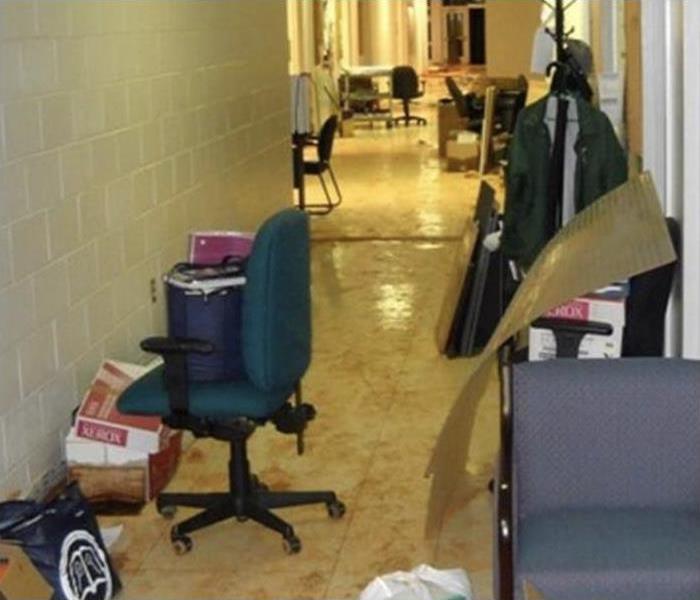 Water damage in a building in Whittier, NC.
Water damage in a building in Whittier, NC.
Four Ways To Avoid Water Damage Claims
Filing a business claim after any water-related incident can help cover the costs while your Whittier, NC, location is repaired. However, there is a chance you may not qualify and still need to pay part of the bill. Additionally, the damage can interrupt or slow down your normal operations. Continue reading to learn how to prevent these events.
1. Shut Off the Valve After a Pipe Break
While a fast response to excess humidity or water is necessary, a leaking or broken pipe can quickly escalate to flooding. You and your employees should know where to locate and how to operate the building's main shutoff valve. Shutting off the valve can temporarily stop the water flow until the problem is resolved.
2. Keep Your Drainage System Clear
Your building's drainage system is essential for diverting precipitation towards a safe location. When leaves, branches and other debris block it, the water can build up and damage the roof and walls, necessitating a business claim. Regular inspection and cleaning of your gutters, downspouts and other drainage paths by experienced professionals can effectively prevent these situations.
3. Seal All Visible Cracks and Holes
The foundation of your building is not immune to cracks, gaps, and holes. These unplanned openings can allow water and high humidity to enter the building and affect anything inside. Additionally, freezing air can enter and damage the pipes, leading to more damage. Seal these breaches with caulk, foam insulation and weather stripping to protect your business.
4. Maintain the Building's Rooftop
A strong rooftop is crucial for the well-being of your property. Accumulated water or snow can weaken the structure and seep into the building, while the formation of ice dams can block your drainage and create further problems. Schedule inspections and maintenance by roofing professionals and keep track of the roof's load limits.
Although you will need a business claim to obtain help from a water damage remediation team, it is ideal to prevent this scenario. Enact the necessary strategies to keep your property safe from destruction.
What You Should Know About Buying Shutters for Your Home
6/14/2022 (Permalink)
Protect Your Property from High Winds
While there’s no doubt that window coverings impact the appearance of your residence, they also can serve an important function, especially in areas that are prone to high winds, such as coastal states that may experience hurricanes. Shutters help protect the windows of your home in Robbinsville, NC, during windstorms and hurricanes. The cost to repair windows averages over $8,000 post-disaster, considerably more than the $3,500 estimated average for shutter installation.
Exploring the Costs of Storm Shutters
There are various types, each with a different cost per square foot:
Aluminum accordion: Lightweight and strong, up to $30 per square foot
Roll-up or roll-down: Mechanically or automatically controlled, $25 to $60 per square foot
Bahama or Bermuda: Aesthetic and offers shade on sunny days, $20 t0 $35 per square foot
Colonial hurricane: Timeless style, $25 to $35 per square foot
Motorized or electric hurricane: $6,360 to $10,560 for the entire home
Storm panels: Removable, $10 to $20 per square foot
Clear polycarbonate: Can stay in place without obscuring views, $10 to $15 per square foot
Fabric: Removable, $5 to $15 per square foot
Average installation costs range from $45 to $100 per hour. Consider the labor rate and the total time of installation when budgeting to protect your property from high winds.
Considering Other Benefits
Other than the visual impact of these window coverings, consider these advantages. Some options also help reduce your energy costs thanks to the added insulation. They also improve privacy. If you live in an area that’s prone to high winds and hurricanes, your insurer may offer a discount on your homeowner’s insurance.
A good homeowner knows to contact damage restoration professionals to make repairs after a disaster. A good homeowner also knows that preparation is important as well. Adding window coverings to your home protects your windows ahead of storms.
After the Flood, Don't Forget the Crawlspace
6/2/2022 (Permalink)
Whether pipe bursts or floodwaters rise in Sylva, NC, there is a chance you will experience a home flood. Even if there isn’t much water, that doesn’t mean that the often-forgotten crawlspace hasn’t experienced flooding. If that happens and it goes unchecked, it may mean long-lasting issues.
Cleaning a Flooded Crawlspace
At the first signs of a water issue, it’s vital to take the following steps:
Work to stop the flow of water. While this may not be possible when due to natural flooding, a pipe leak or burst only requires turning off the main valve.
Once the water is no longer entering the area, a vital component of preventing the home flood from causing more damage is water extraction. A wet-dry vacuum can be used, but this may take more time as opposed to an industrial-grade pump. The type of flooring should also be considered. If it is a dirt floor, the mess will likely require the expertise of an expert.
The next step is drying the space out. While the visible water may be gone, the structural components of the home likely absorbed a significant amount of the water. The faster studs, walls, and joists are dried the less likely the chance of mold growth. Fans and dehumidifiers should be used to eliminate excess odor.
After the area is dried, it will need to be disinfected and deodorized with flood-approved products.
Contact a Restoration Company
In many cases, accessing the crawlspace is a difficult situation. Knowing how important it is that all water is removed and affected areas are cleaned properly, this type of cleanup is best left to a certified water and storm damage remediation company. Along with having the industrial-grade equipment to speed up the extraction and drying processes, it will also have trained technicians able to handle all forms of damage and restoration.
While it may be out of sight, ensure your crawlspace isn't out of mind after experiencing a home flood. Like any other area of the home, fast cleanup is essential to avoiding lingering issues.
After the Fire: 3 Actions Your Cleanup Crew May Take
5/24/2022 (Permalink)
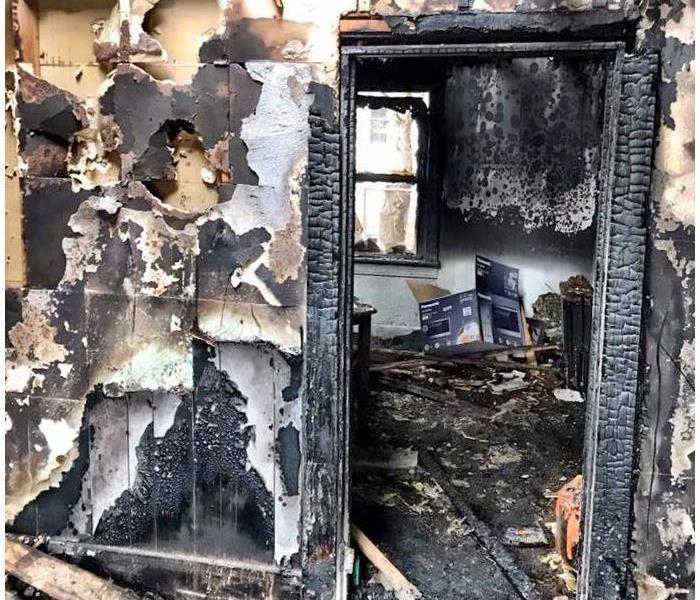 Fire damage in Ellijay, NC.
Fire damage in Ellijay, NC.
Restoring Your Property After a Fire
When a fire rips through your Ellijay, NC, home, viewing the aftermath can feel overwhelming. From charred belongings, smoke damage and flooding caused by fire hoses, you may not know where to begin with cleanup efforts. Calling in a professional fire restoration company can ease your woes, as its technicians can take several steps to restore your property.
1. Mitigation
Once your home is deemed safe to enter, your restoration techs will survey the property to take immediate action that will help prevent further damage and help you save time and money during the cleanup effort. This may include draining away standing water left behind by fire hoses to lower the risk of mold growth and examine the degree of soot damage to your belongings. Then you can begin salvaging important items and setting aside those that you want to preserve.
2. Soot Removal
Soot can stain building materials, furniture and other objects in your home. Your restoration professionals may use a variety of techniques to clean each room and remove soot from places brooms and small vacuum cleaners may not reach. They may also use commercial-grade cleansers on surfaces where the soot is especially thick.
3. Smoke Odor Removal
One of the most difficult problems you might face in the aftermath of a fire is the removal of smoke damage, as stains and the stubborn odor can linger for weeks after a house fire. A smoke cleaning and fire restoration service can assist you with air-cleaning ozone machines that trap and remove odor-causing molecules instead of simply masking their smell.
Facing the aftermath of a fire at your Ellijay, NC, home can feel like the end of the world. Calling professional smoke damage technicians to assist you with the cleanup process can help offer you peace of mind as you move ahead with plans to restore and rebuild.
Remember These 4 Things When Filing a Water Damage Claim
5/19/2022 (Permalink)
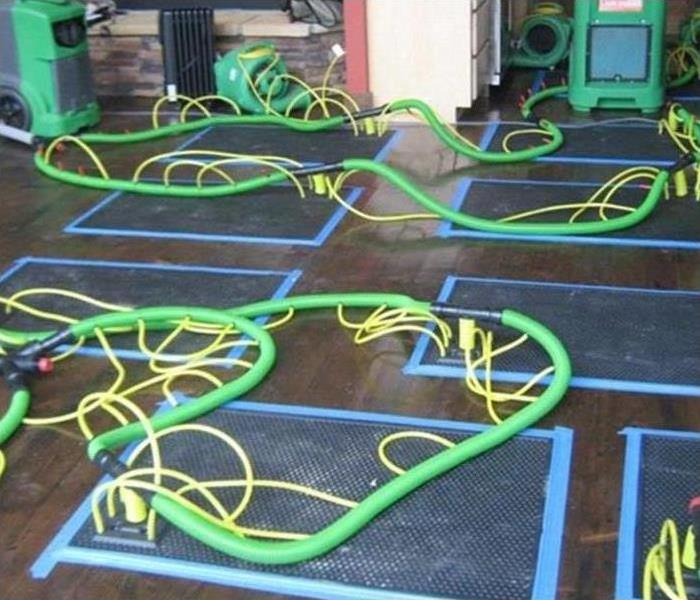 To save these residential floors in Franklin, NC from water damage, we put our floormats to work!
To save these residential floors in Franklin, NC from water damage, we put our floormats to work!
Filing a Water Damage Claim
If bursting pipes have created damage in your Tuckasegee, NC, home then you'll want to get compensation from your insurance company. After all, that's why you make those monthly premium payments. Here are some things to keep in mind when filing a claim.
1. Study Your Policy To Know What It Covers
Different insurance policies reimburse you for different types of damage, so the first thing you should do is read your insurance policy carefully to see what's covered. It's important to know what you're entitled to before you call the insurance company.
2. Contact Your Insurance Agent
When bursting pipes damage your home, let your insurance agent know as quickly as possible. You'll also need to save all receipts whenever you hire someone to fix a broken pipe or do other repairs on your home. Contact restoration specialists to repair any flooding damage and prevent the growth of mold. Document all of the work done.
3. Realize That Claims for Gradual Water Damage Are Often Denied
Damage to your home from bursting pipes is typically noticed right away and files are claimed. However, slow leaks from old pipes or cracks in the basement can bring on gradual damage. As a homeowner, it's your responsibility to maintain your home. If the harm is due to your neglect, the insurance company will likely deny your claim. Talk with your agent to see what is covered.
4. If Your Claim is Denied, Contact Your State Insurance Board
If your insurance company denies your claim and you feel you are entitled to be reimbursed, contact the state insurance board. They may be able to remediate the situation.
Damage to your home from a flood can be devastating, but by filing a claim and contacting the professionals as well as documenting everything, you can restore your home.
4 Benefits of Hiring a Fire Mitigation Professional
5/5/2022 (Permalink)
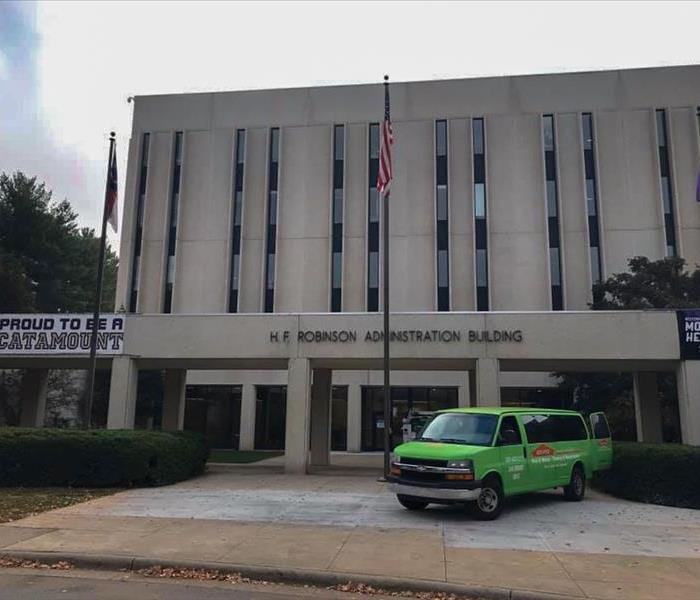 A fire not only leaves behind soot but also smoke damage and potential water damage.
A fire not only leaves behind soot but also smoke damage and potential water damage.
Four Advantages of Hiring a Fire Mitigation Expert
Dealing with the aftermath of a fire at your Cullowhee, NC, business comes with many headaches. From dealing with the insurance adjuster to assessing the fire damage and still keeping your business running, the cleanup and repairs simply add to the stress. Get back to business faster and with peace of mind by hiring a certified professional fire and water damage restoration company. Below are four benefits that make it worthwhile.
1. 24/7 Help
A disaster may strike at any time. A fire mitigation company understands that and is available 24/7 to take your emergency call. After the call is received, you can expect a quick turnaround time for the inspection and assessment.
2. Minimize Damage
Choosing a reputable contractor means choosing a one-stop-shop professional. Mitigation companies are experts at finding hidden damage and properly repairing it to ensure that there are no lingering effects. They will also have the know-how to help you salvage many items that may seem lost forever.
3. Proper Fire Damage Cleanup
A fire not only leaves behind soot but also smoke damage and potential water damage. Each type of damage requires its own unique methods and tools to repair. A restoration expert already has the industrial-grade equipment and know-how to handle whatever issues the property faces.
4. Save Time and Money
Since time is money, saving on both is an ideal solution. Tackling damaged property on your own may turn into a long process with added costs. Experts provide a detailed assessment of the work that needs to be done along with a schedule to get your business back to normal as fast as possible.
Cleaning up fire damage is a difficult and time-consuming task. By using a licensed specialist, you can focus on your business and have peace of mind that repairs will be done right.
What Sets the Best Disaster Recovery Teams Apart?
4/22/2022 (Permalink)
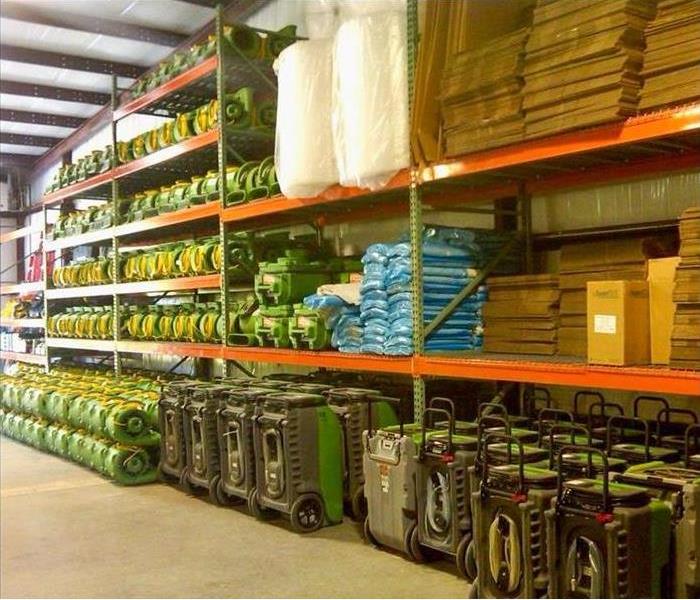 We have the equipment for any restoration job.
We have the equipment for any restoration job.
What Distinguishes the Most Effective Disaster Recovery Teams?
Disaster recovery is a process that involves many moving parts. The first priority is to document damage, and this must take place before mitigation. It is then necessary to take measures to limit the severity of damage within hours. The top restoration teams have the training, equipment and resources necessary to respond to any incident in Andrews, NC, whether the damage is confined to a single structure or affects multiple properties.
Trained Cleanup Experts
Skill sets distinguish experienced restoration providers from amateurs entering the field. Here is several Institute of Inspection Cleaning and Restoration Certification credentials that set the best teams apart from the rest:
- Commercial Drying Specialist
- Contents Processing Technician
- Fire and Smoke Damage Restoration
- Technician
- Water Damage Restoration Technician
The leading storm response service will include one or more certified technicians along with trained employees. These experts work together to make the most informed recommendations regarding damage mitigation, cleanup and restoration.
Specialized Restoration Equipment
In addition to expertise regarding procedures, the best disaster recovery teams also have access to industry-leading equipment. From dedicated cleaning machines for damaged contents to pumps for safely extracting water and cleaning solutions for smoke residue, property owners can count on the leading services to know how to use the right tools for any job.
An Extensive Network
The best storm damage response teams are backed by an extensive network. A national restoration company with more than 1,700 franchises across North America is likely to have several locations in any region. This means that specialists and equipment can be made available in the places that need them most.
A disaster recovery service that lacks any of these elements will not be as effective. Property owners and insurers should seek out a restoration company that maintains the highest industry standards for cleaning up fire, water, storm or any other type of property damage in Andrews, NC.
Answering Common Questions About Commercial Generators
4/13/2022 (Permalink)
There are lots of things you can do to get ready for an upcoming storm in Hayesville, NC. You can create emergency preparation kits and store the contact information for commercial restoration professionals. You should also purchase a generator for your property. This unit can keep your building running during a power outage. Here is some more information about this equipment.
What Types of Generators Are Available?
Different types of power can be used to operate generators. This equipment may utilize:
- Solar power
- Diesel
- Natural gas
- Liquid propane
You should weigh the pros and cons of each energy source before deciding which unit to buy. Natural gas, for instance, is relatively cheap, efficient and clean. However, it could also create a fire hazard. Diesel generators, meanwhile, have great fuel efficiency but can be loud and bulky.
How Long Do Generators Last?
Besides picking the right generator for your needs, you also want one that lasts for a long time. After all, you probably cannot afford to replace this piece of equipment every few years.
Luckily, most generators last between 3,000 and 5,000 hours. While that might seem like a short lifespan, remember that you will probably be turning off the unit at night when everyone has gone home. In fact, you will likely only use the equipment a few times each year at most. This means the unit could last up to 20 years.
There are also steps you can take to increase the life span of this piece of equipment. Have a professional check the unit regularly for any generator problems. The expert can then fix these issues before they cause the equipment to malfunction. The pro should specifically unclog any dirty parts and replace worn-down pieces.
Depending on the needs of your business, you can purchase a generator powered by the sun, liquid propane, diesel, or natural gas. Whichever type of equipment you pick, keep it maintained and cleaned properly so it lasts for decades.
Do You Have Enough Fire Alarms in Your Home?
4/7/2022 (Permalink)
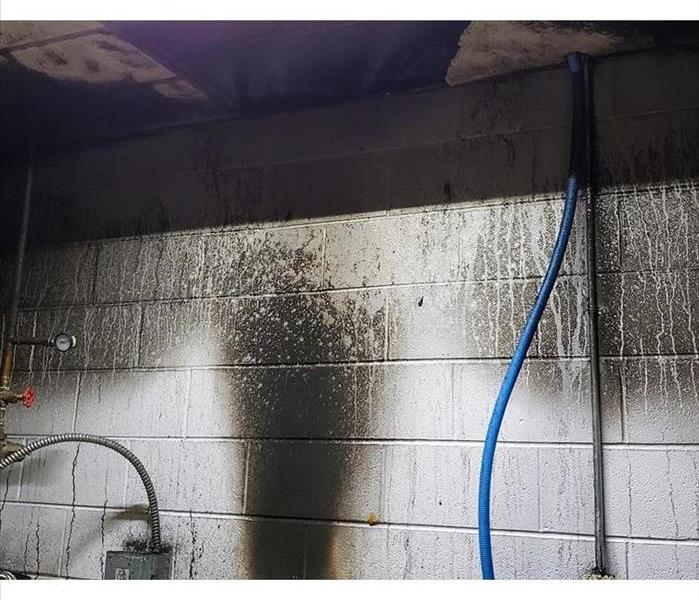 Make sure you test your alarms frequently.
Make sure you test your alarms frequently.
A fire alarm helps to keep your family safe in Cullowhee, NC when a fire breaks out. Most people think one or two alarms are sufficient, but the National Fire Protection Association recommends that the number of alarms you install should be based in large part on the size of your home.
How Many Alarms Do You Need in Your Home?
The NFPA strongly suggests that alarms be placed in the following rooms to avoid devastating fire damage:
- One alarm should be installed in each bedroom. An additional alarm should be placed in the hallway near the bedrooms. If the bedrooms are situated in different areas of the home, you will need an alarm in each hallway.
- Place one alarm in the kitchen as well.
- Install at least one alarm on each additional level in your home. Don’t forget the basement since a fire can ignite near or inside the furnace.
How Should the Alarms Be Installed?
The fire alarm can be placed on the ceiling, but it also works well attached to the wall. Just make sure it is situated no more than 12 inches from the ceiling since smoke rises quickly during a fire. Alarms positioned in the kitchen should be at least 10 feet away from the stove and other cooking appliances. Smoke damage caused by kitchen appliances can be very difficult to remove, so call a fire restoration service if you need help with the cleanup. Alarms should never be placed too close to windows, fans, or vents since these devices may interfere with fire detection.
Make sure you test your alarms frequently to ensure they work when you need them. Change the batteries twice a year as well. A good rule of thumb is to change them when you change your clocks.
Keep your family safe with a properly installed and maintained fire alarm in each important room in your home.
3 Things Property Owners Should Understand About Mold Growth
3/30/2022 (Permalink)
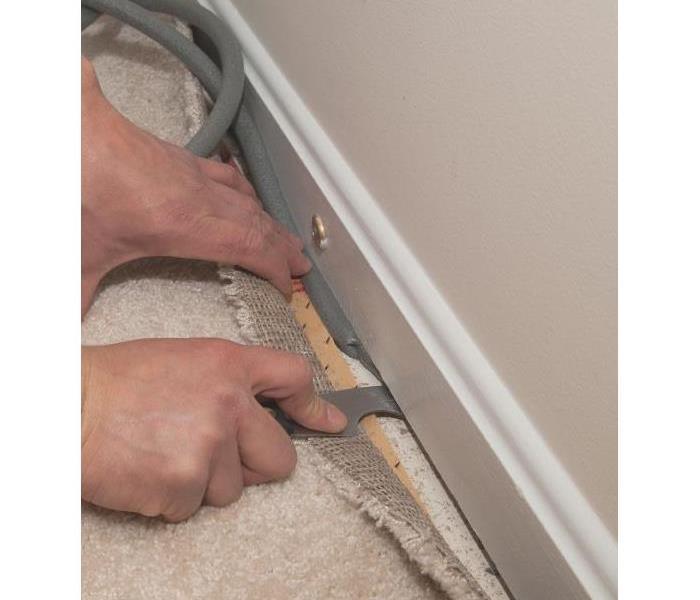 If you suspect black mold is growing, work with an Indoor Environmental Professional (IEP) to assess the premises.
If you suspect black mold is growing, work with an Indoor Environmental Professional (IEP) to assess the premises.
Three Things Every Property Owner Should Know About Mold Growth
Is black mold invading your business walls? Is it spreading within walls or the flooring, eating away at structural material? Business owners must act quickly to fungus, so owners in Murphy, NC, should be aware of what mold is and how to locate it. Property owners should be mindful of the answers to the following three questions.
1. What Are Common Signs of Mold?
Fungus thrives in dark, damp locations, particularly closets, crawl spaces, and kitchens. The development begins unseen and becomes noticeable through dark rings and an unusually strange, musty odor. In fact, the nose acts as one of the first indicators that the property requires mold cleanup. Owners may detect a funky or stale scent. These indicators are a cause of immediate action. The longer someone waits, the more costly and timely the repairs.
2. How Do You Know if the Mold Is Harmful?
If you suspect black mold is growing, work with an Indoor Environmental Professional (IEP) to assess the premises. This specialist is certified to investigate the rooms, determining what is reproducing and how to handle it. They may conduct several tests, including air and structural samples, comparing levels and learning how much of the space is affected. This testing is the only means of understanding precisely what has infested the business.
3. How Is Mold Removed?
To reduce the spore count and eliminate the hazard, owners should look for a mold remediation company to follow the IEP's information. These employees begin by drying out saturation and examining fixtures and belongings. Using high-tech equipment, they can clean documents and electronics. Drenched, porous objects are removed as they cannot be thoroughly sanitized. The room is washed with soap and water as well as sprayed with antimicrobial formula. Anything ruined is replaced.
When something seems amiss, it could be black mold. To know for sure, rely on an IEP to survey the building and guide you inappropriately securing and cleaning up the property.
3 Things You Should Know About Flood Zones
3/24/2022 (Permalink)
Flood Zones: 3 Things You Should Know
As a homeowner in Andrews, NC, it is important to have as much information as possible to keep your family and your property safe, but there are some things you may not think to consider. Whether or not your home is located in a flood zone might not usually cross your mind, but this knowledge can be incredibly helpful. Here are a few things that you should know about these areas.
1. What Is It?
As the name suggests, a flood zone is an area that has an increased risk of flooding during severe weather. The Federal Emergency Management Agency, or FEMA, determines the risk in each area and gives them a rating based on the type of floods that occur and the severity of the damage it causes.
2. How Do You Determine if You Are in One?
If you want to see if your home is in one of these zones, the process is simple. FEMA provides resources, such as a Flood Insurance Rate Map, that homeowners can download from their website. This will show you in which type of zone your property is located. Their maps are updated often, so you can check back over time to see if there have been any changes.
3. How Will This Affect You and Your Property?
Living in a flood zone can make things more difficult for you, depending on the usual severity of flooding. In some cases, you may end up with damage to your home that requires an emergency restoration service. You might be required to purchase additional flood insurance for your home as well.
While owning a home in one of these areas might not be ideal, having the necessary information can help you be more prepared in case of an emergency. If you know that there is a storm coming, take steps to keep your family and belongings safe. If there is damage to your home, know that there are services available to help.
How Can Wet Documents Be Restored?
3/19/2022 (Permalink)
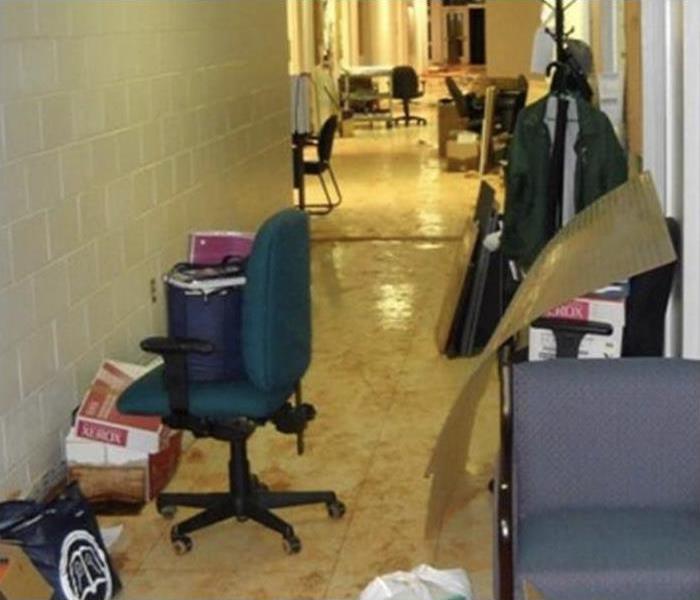 Floodwater causes damage to documents and contents inside an office building.
Floodwater causes damage to documents and contents inside an office building.
Water Restoration for Documents
If your building floods, there’s a chance that some of your most important documents could be damaged. Losing key records, original documents, books, and photos can be one of the most devastating effects of flooding. Fortunately, with specialized technology and innovative techniques, restoration professionals can often salvage and even restore wet documents.
1. Transfer to Restoration Facility
First, a document restoration team transfers wet and water-damaged documents to a secure restoration facility. These facilities are typically subject to 24-hour surveillance and are managed by HIPAA-Master-certified restoration technicians. Once they arrive at the restoration facility, water-damaged documents, and paper goods are carefully separated, inventoried, and cataloged to ensure nothing is misplaced or out of order.
2. Freeze-Drying
Next, restoration specialists use a unique vacuum freeze-drying process to dry the documents. This process is the same method that the U.S. Library of Congress uses for valuable books and historic documents and is the only document restoration process that is currently approved by the National Archives and Records Administration.
This specialized document drying technique can be used to safely restore many types of wet documents and paper goods, such as:
- Books
- Files
- Photographs
- Maps
- Magazines
- Manuscripts
- Blueprints
- Film and microfiche
- Parchment
- X-Rays
- Negatives
3. Gamma Irradiation
Most floodwater contains at least some contaminants, such as dirt, pesticides, bacteria, chemicals, and viruses. These contaminants may not be visible to the naked eye, but they can penetrate documents and cause ongoing damage. Restoration professionals use a state-of-the-art gamma irradiation procedure to clean, sterilize, and deodorize important documents without causing further damage.
4. Digitizing
Finally, the document restoration team carefully scans each document to create a high-quality digital copy. These digital versions are then added to the initial computerized inventory and cross-referenced, creating a convenient and searchable document catalog.
If a flooded building leaves you with wet documents, all is not necessarily lost. Contact an experienced document restoration company near Cashiers, NC, right away for the best chance at restoring these valuable items.
How a Lightning Strike Can Affect your Home
2/16/2022 (Permalink)
What Can A Lightning Strike Do To Your House?
If you live in Franklin, NC, you may be wondering if it’s possible for a lighting fire to strike your home. While this force of nature may seem alarming, the odds of having your home struck is roughly 1 in 200.
Facts to Know About Lighting
Understanding this force of nature can help you know the risks to your home.
• Most strikes occur outdoors in open areas
• A strike always takes the path of least resistance to the ground
• A lightning rod can provide a straight path and help protect your home
• Only 18 percent of strike related fires were house fires
• Most strike related fires start in the attic or around electrical wiring
• A strike may result in power surges
What to Do if Your Home is Struck
If your home is hit during a storm it’s best to call the fire department regardless of if you see a lighting fire. Tell them your home was hit by lightning so they can send someone to inspect it and look for any signs of damage or possible fire. They will tell you if the house is safe. Afterwards you can call your insurance and have a licensed electrician look over the building’s wiring.
What Should be Done if a Fire Occurs
In the event your home is struck resulting in a house fire, it’s important to get everyone out as quickly and safely as possible and call the fire department. Once the fire is out you should contact your insurance company and any fire damage restoration services they may recommend. These professionals can conduct any clean up and repairs that may be needed, and the cost is usually covered under most homeowner's insurance policies.
A lighting fire can be just as damaging as any other kind. Fortunately, precautions like a lightning rod may help. If your home is hit it’s important to call the fire department for an assessment regardless of if you have an obvious fire. Afterwards you can make any repairs necessary to the home.
Emergency Preparation: What Every Property Manager Should Do
2/16/2022 (Permalink)
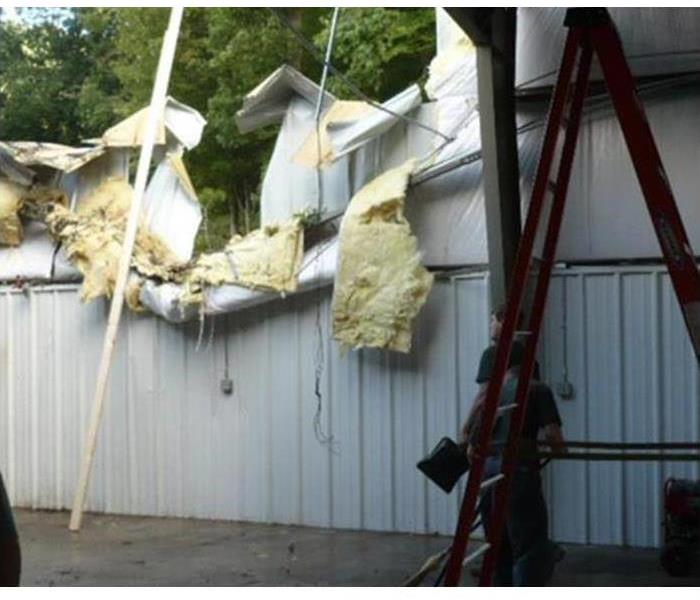 The damage you see in this image was caused by severe storms that impacted our area. Our team was brought in to repair the damage.
The damage you see in this image was caused by severe storms that impacted our area. Our team was brought in to repair the damage.
What Every Property Manager Should Do In Case Of An Emergency
Property management is challenging and a tremendous responsibility, especially for buildings with multiple tenants and families. A significant part of a manager’s job is emergency preparation, specifically in the terms of storm preparedness. There are at least four tasks every manager should complete to ensure the protection of every tenant.
1. Create a Contact List
Every manager should have a master contact list. This list should include specifics about the apartment or complex and the tenants living or operating there. It should include names, phone numbers, email addresses, as well as the number of children, pets and whether the people have a disability.
2. Compile Emergency Services Numbers
Beyond knowing who lives or works in the building, basic storm preparedness means having a list of all emergency service numbers. This list should be copied and posted near every phone, ensuring that anyone discovering an emergency situation knows who to call.
3. Routinely backup Emergency Lists
It is not enough to make the lists because a list is only as good as the information on it. A list with tenants that are no longer tenants will only confuse emergency services and potentially waste time and risks lives. It is crucial that all number are routinely updated to ensure accurate information.
4. Prepare an Emergency Plan with Restoration Services
Beyond having up-to-date contacts, a property manager would be doing an excellent service to their tenants by calling a disaster restoration specialist in the Cashiers, NC, area and developing an emergency response plan. These plans ensure that quick action is taken to start the restoration process, minimizing the length of time tenants have to stat out of the facility.
Storm preparedness is one of the most important elements of a property manager’s job. If done right, a manager can potentially save lives. However, if done poorly, lives may potentially be put at risk.
Save Damaged Documents With SERVPRO
2/16/2022 (Permalink)
SERVPRO Can Help You Save Documents That Have Been Damaged.
As an insurance agent, you always have to consider cost when working on residential damage claims. One issue that can lead to high expenditures is document restoration, especially where highly valuable items are concerned. Luckily, SERVPRO has a drying solution that can work for both you and your Andrews, NC, clients.
What It Is
The drying process is completed by restoration specialists who are trained in proper recovery techniques for both papers and photographs. The steps involved include the following:
- Drying - This is completed with a modern vacuum freeze-drying method, used by the Library of Congress to save important documents.
- Disinfection - This is accomplished through gamma radiation that helps to eliminate viruses, bacteria or other harmful contaminants.
- Digitizing services - These special services allow you to preserve documents in a digital form, where they can no longer be harmed by natural disasters or fires.
SERVPRO’s freeze-dry document restoration process is the only one that is approved by both the General Services Administration (GSA) and the National Archives and Records Administration (NARA). The company’s state-of-the-art facilities and highly trained technicians combine to ensure that each document is preserved and restored as thoroughly as possible.
What Is Covered
Besides important paperwork and treasured photographs, the drying process can be applied to the following types of documents:
- Books
- Negatives
- Magazines
- Manuscripts
- Maps
- Parchment
- Microfiche
- Films
- X-rays
- Blueprints
There are very few limits on what kinds of homeowner documents can be dried and restored using the freeze-dry and decontamination process.
How It Helps
Insurance professionals like you know that restoration is always more cost-effective for an insurance company than replacement. This is especially true in a situation where something priceless is considered, such as a cherished photograph or a rare document. Document restoration from SERVPRO is one way that insurance providers, like the one you work with, can cut back on claims costs while keeping customers happy.
Flood Damage and Frozen Pipes: 3 Important Insurance Facts for
1/26/2022 (Permalink)
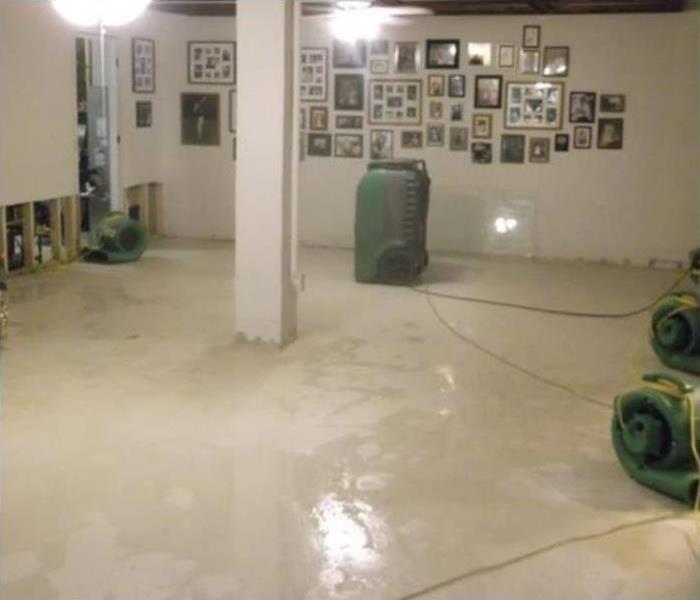 Drying up a house that has suffered from flooding.
Drying up a house that has suffered from flooding.
Learning the Details of Your Coverage
Investing in homeowner’s insurance can protect your Murphy, NC, home when unexpected disaster strikes. However, when it comes to flooding, you may worry about gaps in your coverage and which circumstances are covered. Some instances, such as flooding as a result of a burst water pipe during cold weather may allow you to file an insurance claim; however, it is important to understand what you can expect as far as how much of the damage will be covered and what you might have to pay for out of pocket.
1. Preventative Measures Can Affect Coverage
Some insurance companies require that you take preventative measures to prevent frozen pipes. For example, insulating them in cold weather and performing regular maintenance that keeps them in good working order may be necessary for filing an insurance claim in the event of a pipe break. It is wise to understand the terms of your insurance coverage so you can take steps to comply.
2. Affected Surroundings Are Usually Covered
Because water damage from a burst pipe can be significant, your homeowner’s insurance will likely cover affected surfaces such as ruined flooring, soaked drywall and wood cabinets. If any building material needs to be removed in order to access frozen pipes, you might be compensated for this too, especially if the temperature plummeted unexpectedly and you did not have the opportunity to insulate them.
3. Pipe Repair Costs Are Typically Not Covered
While your insurance company may help you cover costs for a flood damage and restoration service to come in and repair floors, walls and other structures, you will likely have to pay a plumber out of pocket when it comes to repairing the broken pipe itself. Since this can be a considerable expense, it is a good idea to have a plan in place and to retain the services of a trusted professional before this type of problem occurs.
Being able to file insurance claim when a frozen water pipe breaks and damages your Murphy, NC, home can give you peace of mind during such an incident. However, it is wise to learn the details of your coverage so you are prepared in the face of an indoor winter flood.
Black Mold – Color, Smell and Appearance
1/18/2022 (Permalink)
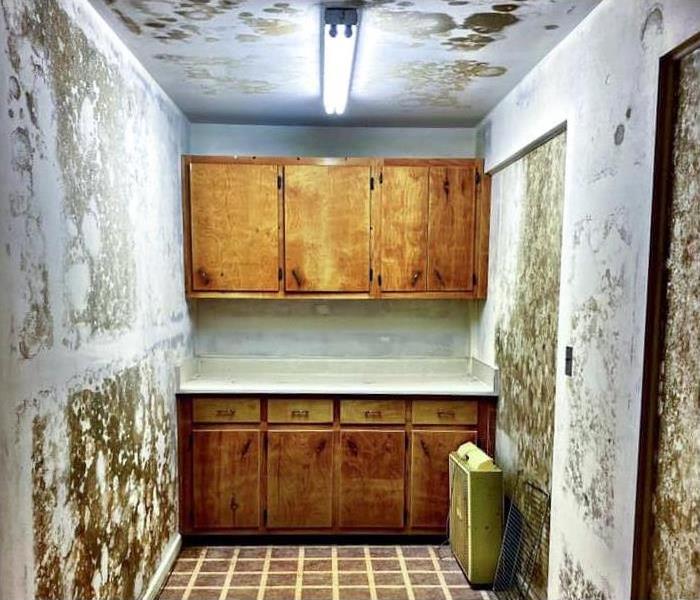 A small water leak in your kitchen can a mold infestation in your Andrews, NC home.
A small water leak in your kitchen can a mold infestation in your Andrews, NC home.
Three Things To Know There is Mold In Your Home
Mother nature employs mold to breakdown natural materials in order to clear the land and open the way for new life. Dead trees, fallen leaves, and even animal carcasses can quickly become covered in mold – and that is a good thing. But when mold moves indoors in Andrews, NC, it can become dangerous, and that is not a good thing. To protect your family, have a mold inspection by a certified mold remediation team at the first sign of the unsightly fungus. The team can generally look for these three things.
1. Color
At first glance, asking if the mold is black appears to be a nonsensical question, but it is not as ridiculous as it first seems. Mold is a fungus that comes in many colors, and quite a few of those colors have been classified by the experts as black, or a species known as stachybotrys chartarum. The fungus thrives in dark places, but they can appear as red, yellow, green and even orange.
2. Smell
Like most other fungi, black mold has a distinctive smell, but unlike other types of fungus, the black smells very musty and more like mildew than having a sharp repellent odor. Because of the lack of a dangerous smell, most people need a mold inspection to find hidden black stachybotrys because they have no idea it is attacking their home.
3. Appearance
Often hidden inside of floors, walls, and ceilings, the rampaging fungus colonies thrive on moisture. That may explain why they appear as velvety and slimy at the same time. However, like other types of house mold, the black variety spreads quickly into patches of soft-looking colonies that eat their environment until they have grown puffy enough to release spores into the air.
Consider having a mold inspection if there is any chance your home has been invaded by mold. That is the best way to guarantee it is not the black type you are fighting. The professionals can quickly assess the issue and address any concerns you may have.
FEMA Assistance FAQ
1/12/2022 (Permalink)
FEMA Assistance FAQ
When natural disasters strike, the Federal Emergency Management Agency, or FEMA, often provides shelter, assistance, and inspections. What can you expect if they show up at your home?
- The representative completes an overall assessment.
- Paperwork is filled out, detailing the extent of the damage.
- Proof of ownership is established.
- Adjusters from insurance companies and the agency assign dollar values to property and belongings.
How Do I Obtain Assistance?
If you believe you qualify for federal disaster assistance, you'll need to apply by contacting www.DisasterAssistance.gov or calling the agency. Act quickly to be sure you don't miss established deadlines. You may qualify for one or several grants to help you recover from flooding. These include grants for expenses related to medical, dental, and funeral costs, emergency home repairs, personal property losses, and temporary housing.
Are All Losses Covered?
FEMA provides grants to help cover costs not covered by your insurance company. This doesn't mean that the entire difference between the overall costs and your insurance coverage will be available. However, a disaster loan from the agency may give you the leeway you need to get your home back into a comfortable living condition. Work with a disaster recovery company in Cashiers, NC, to understand the potential costs.
What Do I Need To Pay Back?
The type of aid you receive affects whether you need to repay any of the funding. If you received grants, for example, you don't need to repay them. If you received loans, however, you will be responsible for repaying the amount. You may also find some relief by applying for a loan through the Small Business Administration. These low-interest loans are often available after natural disasters.
What Are the Requirements?
There are several requirements that may affect whether you qualify. These include providing proof of your citizenship status and proof of homeownership or rental status.
FEMA aid is not meant to cover all expenses related to getting your home back to pre-disaster condition. However, enlisting the agency's help can make the recovery process far less stressful.




 24/7 Emergency Service
24/7 Emergency Service














